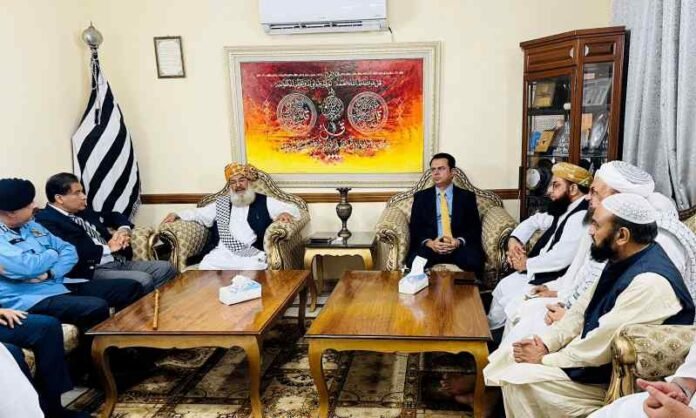Contents
Islamabad — A confrontation unfolded in the capital on Friday after religious groups began reconstructing a mosque that had been torn down earlier this week by city authorities.
The Madni Mosque, located along Murree Road, was demolished in an overnight operation led by the Capital Development Authority (CDA) and police, who said the structure violated building regulations. In its place, the administration quickly planted grass and trees.
But the move sparked outrage. Claiming the mosque had stood on the site since before Partition — long before Islamabad itself existed — clerics and supporters returned to the rubble on Friday. Hundreds gathered for prayers and to protest the demolition, collecting bricks and debris to assemble what they described as a symbolic reconstruction of the mosque.
Clashes Avoided After Heated Stand-Off
The gathering drew a heavy deployment of police and district officials, who feared unrest during the announced protest. At one point, tensions boiled over as protesters and officers came face-to-face. A brief scuffle broke out before a senior police officer stepped in, diffusing the situation through negotiations. The police contingent eventually pulled back from the site.
Legal Complaints Filed Against Top Officials
The demolition has already triggered legal challenges. At least five separate complaints have been filed at the Secretariat police station, naming the interior minister, CDA chairman, Islamabad’s deputy commissioner, and senior police officials. The petitions call for cases under Pakistan Penal Code sections related to desecration of places of worship. Police confirmed receiving the complaints but have not issued any official receipts.
Administration Silent
So far, neither the CDA nor the Ministry of Interior has commented publicly on the situation. Their silence has further fueled anger among the protesting groups, who see the demolition as a violation of both religious and historical sentiment.
The dispute over Madni Mosque highlights the fragile balance Islamabad faces between enforcing urban planning rules and avoiding confrontation with powerful religious organizations — a challenge that has repeatedly tested the city’s administrators in recent years.


